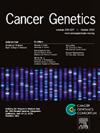Upregulation of Uracil DNA Glycosylase (UNG) in Prostate Cancer
IF 2.1
4区 医学
Q4 GENETICS & HEREDITY
引用次数: 0
Abstract
Prostate cancer is the second most common malignancy and a major cause of cancerrelated deaths in men. Dysregulation of DNA repair mechanisms, particularly those involved in base excision repair (BER), contributes significantly to carcinogenesis. Alterations in this pathway have been linked to aggressive tumor behavior, early recurrence, and poor survival, positioning DNA repair as a promising therapeutic target. This study focused on the expression of two BER genes, uracil DNA glycosylase (UNG) and 8-oxoguanine DNA glycosylase (OGG1), in tumor and adjacent normal prostate tissues. Fifty prostate cancer patients were enrolled. Tumor and adjacent normal tissues were obtained using tru-cut biopsy. Gene expression levels of UNG and OGG1 were assessed by quantitative real-time PCR. UNG expression was significantly elevated in tumor tissues compared to normal tissues, showing a 3.39-fold increase (p = 0.02). OGG1 expression also increased by 2.60-fold, but this was not statistically significant (p > 0.05). A positive correlation was observed between UNG expression and PSA levels in tumor tissues (r = 0.341, p = 0.01). No statistically significant difference in gene expression was found between tumor and normal tissues with respect to clinical parameters such as diabetes, hypertension, PIRADS score, Gleason score, smoking status, or presence of nodules. UNG is significantly upregulated in prostate cancer and may help maintain genomic stability and tumor cell survival. Targeting UNG alongside DNA-damaging therapies could disrupt cancer progression. Further studies on BER genes may support personalized treatment approaches in prostate cancer.
尿嘧啶DNA糖基化酶(UNG)在前列腺癌中的上调
前列腺癌是第二常见的恶性肿瘤,也是男性癌症相关死亡的主要原因。DNA修复机制的失调,特别是涉及碱基切除修复(BER)的DNA修复机制的失调,对癌症的发生起着重要的作用。这一通路的改变与肿瘤的侵袭性行为、早期复发和较差的生存率有关,这使得DNA修复成为一个有希望的治疗靶点。本研究重点研究了尿嘧啶DNA糖基化酶(UNG)和8-氧鸟嘌呤DNA糖基化酶(OGG1)两个BER基因在肿瘤和邻近正常前列腺组织中的表达。50名前列腺癌患者被纳入研究。采用真切活检法获得肿瘤及邻近正常组织。采用实时荧光定量PCR检测UNG和OGG1基因表达水平。与正常组织相比,UNG在肿瘤组织中的表达明显升高,为3.39倍(p = 0.02)。OGG1表达量也增加了2.60倍,但差异无统计学意义(p >;0.05)。肿瘤组织中UNG表达与PSA水平呈正相关(r = 0.341, p = 0.01)。在临床参数如糖尿病、高血压、PIRADS评分、Gleason评分、吸烟状况或结节的存在等方面,肿瘤组织与正常组织的基因表达无统计学差异。UNG在前列腺癌中显著上调,可能有助于维持基因组稳定性和肿瘤细胞存活。靶向UNG和dna损伤疗法可能会破坏癌症的进展。对BER基因的进一步研究可能支持前列腺癌的个性化治疗方法。
本文章由计算机程序翻译,如有差异,请以英文原文为准。
求助全文
约1分钟内获得全文
求助全文
来源期刊

Cancer Genetics
ONCOLOGY-GENETICS & HEREDITY
CiteScore
3.20
自引率
5.30%
发文量
167
审稿时长
27 days
期刊介绍:
The aim of Cancer Genetics is to publish high quality scientific papers on the cellular, genetic and molecular aspects of cancer, including cancer predisposition and clinical diagnostic applications. Specific areas of interest include descriptions of new chromosomal, molecular or epigenetic alterations in benign and malignant diseases; novel laboratory approaches for identification and characterization of chromosomal rearrangements or genomic alterations in cancer cells; correlation of genetic changes with pathology and clinical presentation; and the molecular genetics of cancer predisposition. To reach a basic science and clinical multidisciplinary audience, we welcome original full-length articles, reviews, meeting summaries, brief reports, and letters to the editor.
 求助内容:
求助内容: 应助结果提醒方式:
应助结果提醒方式:


